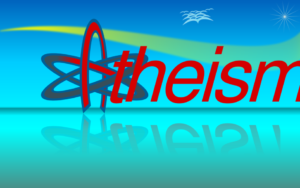Before proceeding to the atheist definition of god it is necessary to ask if a definition of god is valid in itself.
That is to say, is it any more valid for a theist to propose a definition of god than it is for an atheist to do so?
What would be the reference for any proposed definition?
Let’s take as a working example a definition in a Christian context. The reference would obviously be the Bible, with some elaboration based on the writings of the major Christian philosophers, theologians, mystics.
If the theist and the atheist are both to employ these sources for their definition, and if they both commit themselves to be objective, what difference will there be in their definitions?
Why, in such a case, would it be necessary to identify the definition as coming from a theist or an atheist?
Suppose we accept that one would be an affirmative and the other a negative definition. In both cases, then, the word “definition” would be invalid. Both would simply be arguments, for and against.
In the context of any other religion, or even in the case of god in general, there will similarly be the resort to the various scriptures and writings of theologists and believers.
With that as a preamble, we can now look specifically at an atheist definition. The immediate rhetorical response to any such attempt at a definition would be:
Can a thing that does not exist be defined?
This rhetorical question is obviously based on the fact that atheists, by the very fact of being atheists, deny the existence of god.
What they are defining then is not god per se, but god as understood by theists. It may also be suggested that when they deny god they are merely denying god as understood by theists, and not god as such.
Existence or nonexistence of god
The entire argument, then, is not about the existence or nonexistence of god, but the truth or falsity of the various beliefs.
Where does that leave god? Nowhere; because as soon as one replies that this only proves that god does not exist, or another replies that it only shows that god exists but has not accurately been described or understood, we are simply going round in circles.
Is this a non-issue?
 Why are atheists so pre-occupied with this debate? Why can’t we say that whether you believe or don’t believe is entirely a personal matter; that there is no need to make a public issue out of it?
Why are atheists so pre-occupied with this debate? Why can’t we say that whether you believe or don’t believe is entirely a personal matter; that there is no need to make a public issue out of it?
This appears to be an impossible demand because each side is intent not only in adhering to its own conviction but is even more intent on convincing others.
And so the argument rages on. And thus we are faced with the oxymoron of asking an atheist to define god.
What should we do? Shall we join the party and attempt a definition, or shall we desist? Or, again, is there a middle course?
Suppose we say that there are true atheists and there are those who think they are atheists. What’s the difference? A strict atheist is really not a party to this debate at all. This may be wishful thinking, but ideally, to the strict atheist, this whole debate is as amusing as a debate about the existence of Zeus.
 The self-proclaimed atheists, or shall we say, misguided atheists, are actually battling the demons in their own minds. These are demons which are a residue of their upbringing; or of their quashed hopes; or the resilient beliefs of their loved ones.
The self-proclaimed atheists, or shall we say, misguided atheists, are actually battling the demons in their own minds. These are demons which are a residue of their upbringing; or of their quashed hopes; or the resilient beliefs of their loved ones.
It seems there can be no rest for them till this whole matter, even the very idea, of god has been wiped off the face of this earth.
This reminds us of the case of those who set out to wipe out evil in others because they are unable to wipe it out from their own hearts.
But have we been avoiding the issue by this lengthy perambulation? The question still stands: What is the atheist’s definition of god?
The answer can only be very limited in scope; it can only be what this particular atheist has to say; which is that god is nothing but a hazy name for the haunting urge in the human heart for a beacon.






